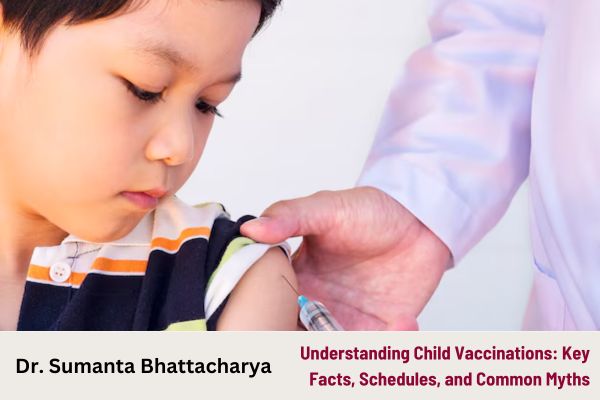Understanding Child Vaccinations: Importance, Schedules, and Myths with Dr. Sumanta Bhattacharya
Vaccination is one of the most effective ways to protect children from serious, preventable diseases. Despite their proven benefits, many parents still have questions and concerns about vaccines. Dr. Sumanta Bhattacharya, a leading pediatrician, helps clarify the importance of vaccinations, the recommended schedules, and addresses some of the common myths surrounding childhood immunization.
The Importance of Child Vaccinations
Vaccines play a critical role in safeguarding children’s health by protecting them from a range of potentially life-threatening diseases such as polio, measles, diphtheria, and hepatitis. Vaccines are designed to trigger the immune system to produce antibodies without causing the disease itself, helping children develop immunity in a safe and controlled way.
By vaccinating your child, you not only protect them from these diseases but also help prevent the spread of infections in the community. This is known as herd immunity. When a significant portion of the population is vaccinated, the spread of contagious diseases is minimized, providing protection to those who cannot be vaccinated, such as infants, elderly individuals, and those with compromised immune systems.
Recommended Vaccination Schedules
Vaccines are administered in a series of doses at specific ages to provide the best possible protection. Here is an overview of the vaccination schedule followed in India, recommended by health authorities, to ensure your child is adequately protected:
- At Birth:
- Hepatitis B (first dose)
- 2 Months:
- DTaP (Diphtheria, Tetanus, Pertussis)
- IPV (Inactivated Poliovirus Vaccine)
- Hib (Haemophilus influenzae type b)
- PCV13 (Pneumococcal conjugate vaccine)
- RV (Rotavirus)
- 4 Months:
- DTaP
- IPV
- Hib
- PCV13
- RV
- 6 Months:
- DTaP
- IPV
- Hepatitis B (third dose)
- RV
- PCV13 (booster)
- 12-15 Months:
- MMR (Measles, Mumps, Rubella)
- Varicella (Chickenpox)
- Hib (booster)
- PCV13 (booster)
- Hepatitis A (first dose)
- 4-6 Years:
- DTaP (booster)
- IPV (booster)
- MMR (booster)
- Varicella (booster)
These vaccines are specifically scheduled to provide maximum protection at the right age when children are most vulnerable to these diseases.
Debunking Common Myths About Vaccines
Despite the overwhelming evidence supporting the safety and efficacy of vaccines, some myths and misconceptions continue to circulate. Dr. Sumanta Bhattacharya helps clear the air about some of the most common vaccine myths:
Myth #1: Vaccines cause autism.
This myth started from a 1998 study that has since been debunked. Extensive research has shown no link between vaccines and autism. Vaccines are safe and do not cause developmental disorders.
Myth #2: Vaccines overwhelm the immune system.
Children are exposed to thousands of antigens daily through food, bacteria, and environmental factors. The small number of antigens in vaccines is well within the capacity of the immune system to handle, without overwhelming it.
Myth #3: Vaccines are not needed because diseases have been eradicated.
While diseases like smallpox have been eradicated thanks to vaccines, others like measles and polio are still present in many parts of the world. If vaccination rates decline, these diseases could resurface, causing widespread illness.
Myth #4: Natural immunity is better than vaccine-induced immunity.
While natural immunity occurs after getting the disease, it comes with the risk of severe illness, complications, and even death. Vaccines provide immunity without exposing the child to the dangers of the disease.
Myth #5: Vaccines contain harmful ingredients.
Some parents worry about the ingredients in vaccines, such as preservatives and adjuvants. However, the ingredients used in vaccines are safe and have been extensively tested to ensure they are not harmful in the amounts used.
Why Vaccination is Essential for Your Child’s Health
Vaccines are an essential part of your child’s healthcare and play a crucial role in preventing diseases that can lead to severe health complications or even death. They are among the most well-researched medical interventions available and have helped eradicate or reduce many infectious diseases that were once major health threats.
By following the recommended vaccination schedule, you are not only protecting your child but also contributing to the well-being of the entire community.
Conclusion
Child vaccinations are a vital component of preventive healthcare. By understanding their importance, following the vaccination schedule, and addressing common myths, parents can help ensure their children stay healthy and protected from dangerous diseases. If you have any doubts or concerns about your child’s vaccination schedule or vaccine safety, Dr.Sumanta Bhattacharya is available to provide expert advice and guidance tailored to your child’s health needs.

